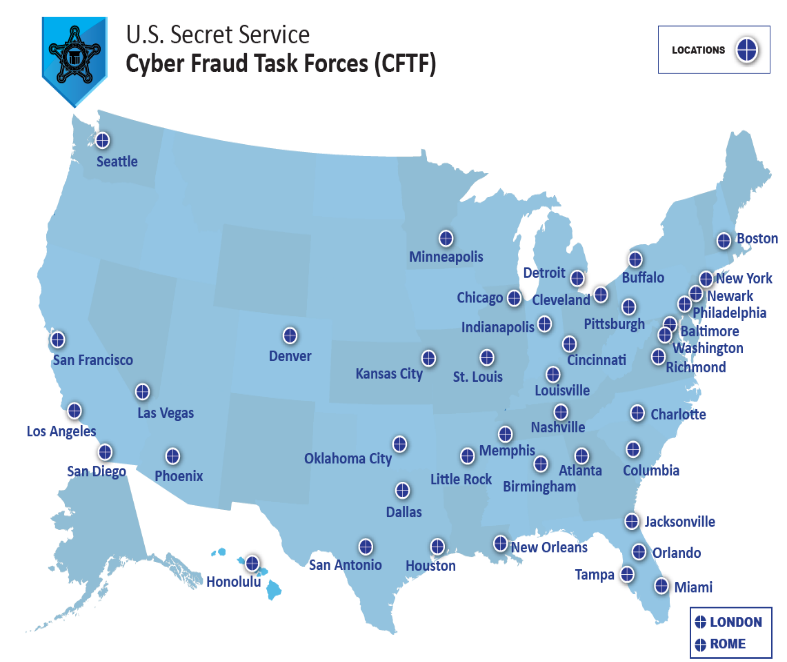
WASHINGTON - In recognition of the growing convergence of cyber and traditional financial crimes, the U.S. Secret Service is formally merging its Electronic Crimes Task Forces (ECTFs) and Financial Crimes Task Forces (FCTFs) into a single unified network, which will be known as the Cyber Fraud Task Forces (CFTFs). The CFTF is an evolution, not a revolution from the ECTF and FCTF model. The mission of the CFTF is to prevent, detect, and mitigate complex cyber-enabled financial crimes, with the ultimate goal of arresting and convicting the most harmful perpetrators.
Since March, the Secret Service has focused its investigative efforts on disrupting and deterring criminal activity that could hinder an effective response to the pandemic and to recover stolen funds from Americans. The CFTF model has allowed for better data sharing, institutional alliance, and investigative skill development. Through these efforts, the Secret Service has successfully disrupted hundreds of online COVID-19 related scams, investigated a number of cyber fraud cases, halted the illicit sales of online stolen COVID-19 test kits, prevented tens of millions of dollars in fraud from occurring, and is leading a nation-wide effort to investigate and counter a vast transnational unemployment fraud scheme targeting the U.S. state unemployment programs.
“The creation of the new Cyber Fraud Task Force (CFTF), will offer a specialized cadre of agents and analysts, trained in the latest analytical techniques and equipped with the most cutting-edge technologies. Together with our partners, the CFTFs stand ready to combat the full range of cyber-enabled financial crimes. As the Nation continues to grapple with the wave of cybercrime associated with the COVID-19 pandemic, the CFTFs will lead the effort to hold accountable all those who seek to exploit this perilous moment for their own illicit gain.” - Michael D’Ambrosio, Assistant Director, U.S. Secret Service
In the past, cybercrime investigators required added training in order to conduct computer forensic investigations, exams, trace IP addresses, and work in conjunction with private technological companies. While traditional financial crimes investigators worked to secure and protect the U.S. financial infrastructure by tracking fraudulent wire transfers, counterfeit checks, and combating counterfeit currency.
In today’s environment, no longer can investigators effectively pursue a financial or cybercrime investigation without understanding both the financial and internet sectors, as well as the technologies and institutions that power each industry. Secret Service investigations today require the skills, technologies, and strategic partnerships in both the cyber and financial realms. Nearly all Secret Service investigations make use of digital evidence, and the greater technological sophistication by bad actors has led to a proliferation of blended cyber-enabled financial crimes.
Through the creation of the CFTFs, the Secret Service aims to improve the coordination, sharing of expertise and resources, and dissemination of best practices for all its core investigations of financially-motivated cybercrime. The CFTFs will leverage the combined resources and expertise of both the ECTFs and FCTFs to collaboratively investigative the range of cyber-enabled financial crimes, from business email compromise (BECs) scams to ransomware attacks, from data breaches to the sale of stolen credit cards and personal information on the Internet.
The Secret Service has 42 domestic CFTF locations with 2 international locations, London and Rome. In the coming years, the Secret Service plans to further extend the CFTF network to encompass 160 offices across the country and around the globe.
The Secret Service, through our CFTFs, stands ready to lead the collective effort in this important fight.
To learn more about the Secret Service’s CFTFs and our investigative mission, visit us online at www.secretservice.gov.

